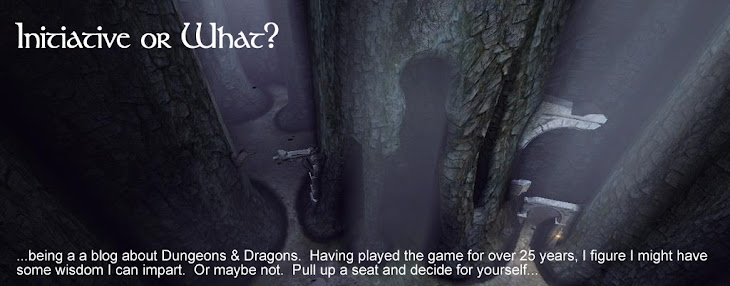Greetings, All!
It's been awhile since I've done any blogging, as I've been working on a pretty big project that was finally completed. In a few days, I'll be posting pics and information on my Myst Island campaign for 4th Edition. However, in the meantime, there's something else I'd like to talk about.
There's been a lot of talk on Twitter (my main hangout) as of late regarding the various conceits of Dungeons & Dragons and particularly 4th Edition. Monte Cook's various Legends & Lore articles never fail to encourage in-depth (and often unnecessarily heated) discussion on how the game of Dungeons & Dragons is really to be played.
As a Dungeon Master, I love 4th Edition. It's balanced play, ease of encounter construction, and flexible presentation make it the easiest game I've ever had the privilege to DM. It's because of this flexibility, that I feel comfortable modifying certain rules to help our own game group better enjoy the game. No game is perfect, but 4th Edition allows me to change things up and improve our group's experience without having to invest in yet another game that tries to fix those gaps.
Listed below are most of the house rules I've either implemented or intend to implement. I've avoided listing the ones that are "campaign specific". Thus, these rules are applicable to whatever 4e game I'm running and are listed in no particular order:
1 - Extremely Curtailed Perception Checks.
I discussed why I did this HERE, but the short version is that I wanted more Player participation instead of Character resolution. What I mean by that is that if there is a puzzle or mystery or search, I want my Players to be able to set the course of action, not the character. I now reserve Perception checks only for combat situations involving invisibility.
2 - Minions Have 1 Hit Point Per Level.
It's always bugged me that even a 23rd level Minion has only 1 hit point. I understand that there are reasons for this rules conceit, but I changed it anyway. Minions have 1 hit point per level. Powers that are keyed to taking out Minions are modified to scale up. Missed attacks still do not harm Minions.
3 - Death Is Not The End.
While my own players haven't had their characters experience this yet, they will find that Death is not necessarily the end. Heroes have the option to continue play as a Ghost, with limited abilities. Since Rituals exist to bring back life to a Hero, the Ghost option (based on the Ghostwalk Campaign Setting) allows the Player to continue to participate.
4 - Curtailed Opportunity Attacks.
The only opportunity attacks that occur is when a character attempts to use a ranged or magical attack against an adjacent enemy. Those adjacent enemies get opportunity attacks. This rule applies to monsters as well.
5 - XP Is Not Handed Out.
While I base my encounters on the party level (so they are balanced), I do not hand out XP for said encounters. Instead, I level up the party when I feel it is appropriate. This process saves the Players some math, and I don't have to worry about keeping track of every little bit of XP.
6 - DM Controlled Magic Item Distribution.
I do not allow my players to really "shop" for appropriate magic items (although I have made exceptions for characters joining the campaign "mid stream"). Instead, I monitor what types of items the characters say they'd like, and if appropriate place them in the campaign as needed. Under most circumstances, the items will be random. In larger towns, there may be magic "shoppes", but these places will only carry Common magic items, alchemical reagents, and the occasional ritual.
7 - Action Point Usage (Daily Powers).
If a Player would like to insure that a Daily Power hits, he or she may expend an Action Point in order for that to happen. Because the hit is automatic, it prevents the hit from ever being critical in nature. An Action Point can only be used in this way once per encounter.
8 - Encounter Power Fallback.
If a Player misses his or her enemy with an Encounter Attack Power, the Player has the option to expend a Healing Surge and instead strike the enemy with a Melee or Ranged Basic Attack. This attack must be rolled, but the Character gains a +2 on the attack roll.
9 - Rare Magic Item Challenges.
Characters do not get to automatically determine the powers/effects of a Rare Magic Item. Instead, I have them do a brief skill challenge. You can read about how that works HERE.
10 - Extended Rests Are More Challenging.
Extended Rests are a little more challenging in my game. Not every resting spot is a nice comfy inn or safe castle. I wrote all about how I changed it up right HERE.
That's basically the list. It's not very long, but it's enough to fill in the gaps where the game (for our group) can become "un-fun". I want to hear about the rules your game groups have created to either fill in a gap or improve play. Leave a comment and let me know!
Until next time...
Game excellently with one another.
